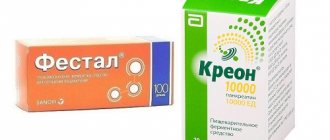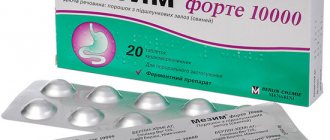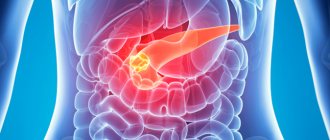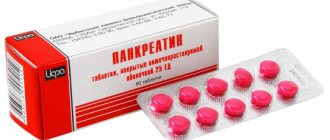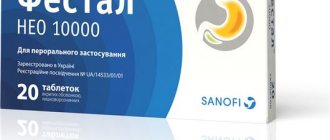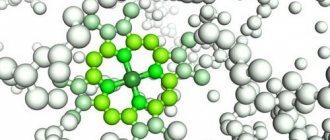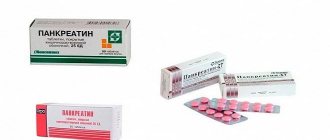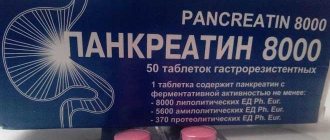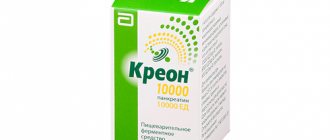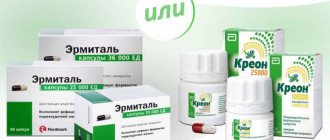Gastrointestinal diseases occur in most of the population. Both chronic diseases and problems caused by poor nutrition are diagnosed. In each of these cases, enzymatic drugs are prescribed (for example, Festal or Pancreatin).
For problems caused by poor nutrition, use the drugs Festal or Pancreatin.
Compound similarities
Pancreatin is the main active ingredient of both drugs. The drugs are available in the form of pills. You can find a lot of similarities in the indications for use and the list of contraindications. These products have enzymatic activity.
List of general indications for use:
- chronic pancreatitis;
- digestive disorders due to a passive lifestyle (bloating, flatulence);
- before an x-ray or ultrasound examination of the abdominal organs;
- liver diseases;
- problems with chewing function;
- chronic pathologies of the gastrointestinal system.
Festal
Available in the form of white glossy round-shaped dragees with a light vanilla scent. Easily dissolves in the intestines. The main active ingredient is pancreatin (192 mg in 1 tablet). It also contains amylases, lipases, proteases, hemicellulose, and bile components.
The action of the medication is aimed at:
- Facilitating the digestion of carbohydrates, fats and proteins.
- Reduced gas formation.
- Production of lipase by the pancreas.
- Absorption of fat-soluble vitamins K, E and A.
The medicine is recommended to be taken for:
- Chronic pancreatitis.
- Biliary insufficiency.
- Flatulence.
- Periodic constipation.
With poor nutrition, chewing disorders and a sedentary lifestyle, Festal helps healthy people digest food.
The drug is often prescribed to patients before an ultrasound procedure and an abdominal x-ray.
The price of Festal can vary from an average of 144 rubles. up to 666 rub . depending on the manufacturer and the number of tablets.
Which is better: Festal or Pancreatin
It is recommended to take medications only after consulting a doctor. You should not self-medicate, because the specialist selects medications taking into account the characteristics of the patient’s body. In this case, possible contraindications and concomitant diseases are taken into account. In some cases, analogues of these drugs are prescribed (for example, Mezim).
Festal is more effective; it breaks down food into simpler substances.
The advantage of Pancreatin is its availability and the almost complete absence of side effects. The disadvantage is the frequent occurrence of allergic reactions, because the body reacts to the substances that make up the tablet shell. Low enzymatic activity is observed due to the small amount of active components.
Comparison of the effectiveness of Pancreatin and Festal
Festal is more effective than Pancreatin - this means that the ability of the drug substance to provide the maximum possible effect is different.
For example, if the therapeutic effect of Festal is more pronounced, then it is impossible to achieve this effect with Pancreatin even in large doses.
Also, the speed of therapy is an indicator of the speed of therapeutic action; Festal and Pancreatin are also different, as is bioavailability - the amount of a drug substance reaching the place of its action in the body. The higher the bioavailability, the less it will be lost during absorption and use by the body.
Contraindications for the use of Festal and Pancreatin
The drugs have many common contraindications:
- allergy;
- intolerance to some components of the composition;
- intestinal obstruction;
- acute pancreatitis;
- cystic fibrosis;
- chronic diseases (exacerbation of inflammation of the pancreas).
You should not take Pancreatin during exacerbation of inflammation of the pancreas.
Festal should not be taken if you have the following diseases:
- acute hepatitis;
- obstructive jaundice;
- accumulation of pus and stones in the gall bladder;
- extrahepatic cholestasis;
- increased bilirubin content in the body;
- liver inflammation;
- stomach disorders.
This drug is not prescribed to children under 3 years of age. It is recommended to swallow the dragee without chewing, but a small child is not able to do this. If the integrity of the shell is damaged, the enzymes will lose their beneficial properties under the influence of hydrochloric acid.
Large doses of this drug can lead to an increase in the concentration of uric acid and deterioration of well-being.
Pregnant and lactating women can take these products only after a doctor's permission, since the active element penetrates into milk.
These medications should not be used for heartburn, as they will only increase the burning sensation in the esophagus.
Comparison of addiction between Pancreatin and Festal
Like safety, addiction also involves many factors that must be considered when evaluating a drug.
So, the totality of the values of such parameters as “o syndrome” in Pancreatin is quite similar to the similar values in Festal. Withdrawal syndrome is a pathological condition that occurs after the cessation of intake of addictive or dependent substances into the body. And resistance is understood as initial immunity to a drug; in this it differs from addiction, when immunity to a drug develops over a certain period of time. The presence of resistance can only be stated if an attempt has been made to increase the dose of the drug to the maximum possible. At the same time, Pancreatin has quite a small value of “syndrome”, however, the same as Festal.
How to use
These medications are taken orally during or after meals. The exact dosage is indicated in the instructions. The tablets should be taken with plenty of warm water. The following liquids should not be used for this purpose:
- tea;
- coffee;
- milk;
- sparkling or mineral water.
If the condition worsens, you should review your diet and eliminate sour, salty, fatty and spicy foods. Each of these drugs can be taken for a long time.
Pancreatin
Available in the form of dragees, brown on the outside and light brown on the inside, with a smooth and shiny surface.
The action of the medicine is aimed primarily at replenishing the deficiency of pancreatic enzymes, as well as facilitating the digestion of food.
The drug is recommended to be taken in the following cases:
- Chronic diseases of the pancreas.
- Gastrointestinal diseases, including hereditary ones.
- Congenital or acquired deficiency of pancreatic enzymes.
- Blocked pancreatic excretory ducts.
- Removal of the pancreas.
- Preparation of special studies of the gastrointestinal tract and abdominal cavity.
- Chewing dysfunction.
The average price of Pancreatin depends on the units of the active substance and varies between 19 rubles. and 77 rub .
Reviews
Alexandra, 36 years old, Yaroslavl: “Several years ago, problems with the digestive system began. To avoid complications, you have to adhere to a strict diet. During breakdowns I take Festal or another drug with a similar effect. I didn’t feel any difference between the medications, because they all quickly cope with unpleasant symptoms.”
Evgeniy, 50 years old, Moscow: “I treated digestive problems with the help of domestic and foreign medicines, but chose Festal. I take it after eating fatty or spicy foods. Other pills only increase the feeling of heaviness.”
Tatyana, 48 years old, Nizhny Novgorod: “After removing the gallbladder, the doctor prescribed Festal. I don’t use it all the time, but only in exceptional cases. It brings relief quickly and does not cause side effects.”
Victor, 50 years old, Krasnoyarsk: “I recommend taking Pancreatin after a heavy meal. It solves the problem in less than 1 hour. With this medicine I can afford to eat fatty foods.”
Comparison of side effects of Pancreatin and Festal
Side effects or adverse events are any adverse medical event that occurs in a subject after administration of a drug.
Pancreatin's side effects are almost the same as Festal's. They both have few side effects. This implies that the frequency of their occurrence is low, that is, the indicator of how many cases of an undesirable effect of treatment are possible and registered is low. The undesirable effect on the body, the strength of influence and the toxic effect of Pancreatin are similar to Festal: how quickly the body recovers after taking it and whether it recovers at all.
Is it worth changing Pancreatin to Festal?
Despite the fact that there is a difference between Festal and Pancreatin, medications are means to compensate for enzymatic deficiency and improve digestive function.
If we compare the annotations for medications, the majority will choose Festal, but this will not always improve the quality of treatment: in some conditions, increased bile outflow can harm the body.
If for some reason you were unable to buy Pancreatin, then you should not drink Festal without a doctor’s prescription. It is better to choose Mezim, which has a similar enzyme content, but differs slightly in the composition of the shell. But Mezim costs more.
Pancreatin or Creon - which is better for the pancreas
Manufacturer: Abbott, Germany
Release form: capsules
Active ingredient: pancreatin
Creon 10000 and 25000 are several times more effective than Pancreatin for a number of reasons:
- this is an original drug with an evidence base;
- capsules contain minimicrospheres that are resistant to gastric juice due to the shell;
- safety and possibility of use by children of the first year of life and pregnant women;
- the therapeutic effect begins 15 minutes after entering the intestines;
- convenient storage in a jar, no need to put it in the refrigerator to preserve its properties;
- positive reviews from doctors and patients.
The cost of Creon is higher.
When choosing between Creon or Pancreatin for one-time use, you can choose the second drug. It is up to 6 times cheaper than its analogue.
What is the difference between Creon or Pancreatin according to doctors and pharmacists:
- Release form: the first is in capsules, the second in tablets.
- The place of action is in the intestines and stomach, respectively.
- Efficiency - Creon is stronger, since all enzymes reach the intestines and begin to act there; Some of the Pancreatin enzymes are destroyed in the stomach.
- Storage – Creon does not require special conditions; Pancreatin must be placed in the refrigerator.
What to choose depends on the indications, frequency of use and financial capabilities.
Difference between drugs
Both Festal and Pancreatin contain the same active ingredient pancreatin. This is an extract of enzymes from the pancreas of pigs. This substance consists of three components:
- Amylase – participates in the breakdown of carbohydrates;
- Lipase – digests fats;
- Protease – necessary for the breakdown of proteins.
Depending on the ratio of these components, the effectiveness of the enzyme preparation is determined, depending on the nature of the food taken. At the same time, Festal also contains bile components, which makes it even easier to tolerate fried and fatty foods.
Festal contains: amylases 4500 units, lipases 6000 units, proteases 300 units, bile components - 25 mg.
Many pharmaceutical companies promote their products under the name “Pancreatin”. There are types of medicines with a high content of enzymes, then their name indicates “Forte”, others contain a smaller amount of the active substance. None of the pancreatins contain bile components.
It is not possible to list all possible ratios of the three enzyme components of the drug called “Pancreatin”, since each manufacturer’s composition will be different, and there are quite a lot of them. When choosing this drug, you should pay attention to the composition directly when purchasing, choosing a medicine according to your needs (if you are intolerant to fatty foods, you need more lipase, protein - protease, etc.).
Indications
Festal should be used in the following situations:
- Exocrine pancreatic insufficiency in combination with diseases of the liver or biliary system: Hepatitis (inflammation of the liver, usually of viral origin);
- Cirrhosis of the liver (replacement of the functional tissue of the organ with connective tissue);
- Removal of the gallbladder;
- Impaired contractile function of the gallbladder;
Indications for use of Pancreatin:
- Exocrine pancreatic insufficiency;
- Chronic pancreatitis;
- Digestive disorders due to errors in diet.
Contraindications
Festal should not be used in the following conditions:
- Drug intolerance;
- Acute pancreatitis or exacerbation of chronic pancreatitis;
- Severe liver diseases;
- Acute hepatitis;
- Jaundice (yellow discoloration of the skin due to increased bilirubin levels in the blood);
- Cholelithiasis;
- Intestinal obstruction (impaired passage of intestinal contents due to blockage of the intestinal lumen by a tumor, scars, adhesions, etc.);
- Age up to 3 years.
Pancreatin contraindications:
- Individual intolerance;
- Acute pancreatitis or exacerbation of chronic.
Side effects
Festal can cause the following reactions:
- Allergy;
- Nausea;
- Diarrhea;
- In children, itching in the anus.
Pancreatin:
- As a rule, it is well tolerated and can cause allergic reactions in case of individual intolerance.
Festal is available in the form of 200 mg tablets:
- 20 pcs. – 110 – 140 rub;
- 40 pcs. – 210 – 250 rub;
- 100 pieces. – 600 – 650 rub.
The cost of Pancreatin tablets largely depends on the manufacturer:
- Pancreatin Forte, 20 pcs. – 25 – 35 rubles;
- 10000 IU lipase, 60 pcs. – 50 – 70 rub;
- 12500 IU lipase, 50 pcs. – 60 – 80 rub;
- 25000 IU lipase, 20 pcs. – 20 – 40 rub;
- 30000 IU lipase, 60 pcs. – 50 – 70 rub.
In case of acute pancreatitis or exacerbation of chronic pancreatitis, none of these medications should be taken. If chronic pancreatitis in remission is accompanied by any disorders in the functions of the biliary system, then preference should be given to Festal. In other cases, you can get by with Pancreatin, but only with a minor degree of digestive disorders.
8 out of 10 people know firsthand what digestive problems are. In this case, both one-time ailments caused by overeating and chronic pathologies requiring long-term treatment are noted. In each of these cases, doctors prescribe enzyme preparations. Most often, the patient receives a list of recommended medications without a separate description of each of them.
The exception is severe diseases of the gastrointestinal tract, since in these cases the correct selection of medication is often crucial. And if a person has to make his own choice when purchasing a drug at a pharmacy, it is important to familiarize himself with each brand name. In this article you will learn the difference between the two most accessible drugs - Pancreatin and Festal.
Festal and Pancreatin belong to the same general pharmacological group - enzyme preparations. But they cannot be called identical analogues in terms of the active substance. Their significant differences lie in their composition. The table shows the names of the substances included in the composition and their dosage in 1 tablet.
The composition of the tablet shells is completely different. But each of them provides protection against the action of gastric juice.
Attention! Pancreatin is produced by private pharmaceutical manufacturers. Therefore, there are different dosages of the drug. The packaging indicates either the amount of pancreatin (100 mg, 125 mg, 250 mg) or the number of active units of protease (25 units).
From the table it becomes clear that the action of Festal is based on the complex interaction of three active components.
The main objective of this drug is to improve digestion; in addition, it has a weak analgesic effect and reduces gas formation (which is why it is often prescribed once, before clinical studies of the abdominal organs). Due to the enzymes included in its composition, “Pancreatin” helps to establish the process of breakdown and absorption of proteins, fats and carbohydrates in the intestines.
The main active ingredient is an extract from the pancreas of cattle or pigs.
In accordance with the instructions, indications for the use of “Pancreatin” are as follows:
- Exocrine pancreatic insufficiency, including chronic pancreatitis and cystic fibrosis.
- Inflammatory processes in the stomach, liver, intestines, gall bladder, including those of a chronic nature.
- Recovery after resection or irradiation of abdominal organs.
- Normalizing the process of digesting food after overeating.
- Preparation for clinical studies of the peritoneal organs.
Most often, Pancreatin copes with its function perfectly and does not cause any problems for patients. However, there are a number of contraindications to its use, as well as possible side effects.
It is prohibited to take the drug:
- in the stage of exacerbation of chronic pancreatitis;
- for acute pancreatitis;
- pregnancy (appointment is possible if the attending physician decides that the benefit to the mother outweighs the risk to the fetus);
- allergy to the components of the drug
"Festal" has properties similar to "Pancreatin". Due to the presence of bile acids in its composition, Festal has proven itself in the treatment of the liver, including the bile ducts inside it.
Bile extract helps normalize the choleretic process, absorption of fats and vitamins. The hemicellulase enzyme included in the composition has a beneficial effect on the breakdown of fiber, which leads to a decrease in gas formation in the intestines and improved digestion.
There are the following indications for taking Festal:
- exocrine pancreatic insufficiency;
- as part of complex therapy for liver damage, including cirrhosis;
- for diseases of the biliary tract, loss of bile acids, disruption of the process of bile formation;
- normalization of the digestive process in healthy people after errors in nutrition, in preparation for examinations, as well as during a forced immobile and sedentary lifestyle.
The list of contraindications for Festal is quite wide and includes the following circumstances:
- allergy to the components of the drug;
- chronic pancreatitis in the acute stage, acute form of pancreatitis;
- precoma, coma or liver failure;
- hepatitis;
- hyperbilirubinemia;
- obstructive jaundice, cholelithiasis;
- intestinal obstruction, purulent inflammation of the gallbladder;
- diarrhea;
- the patient's age is under 3 years, pregnancy (possibly after consultation with a doctor).
The indications and contraindications for use of Pancreatin and Festal are similar, so the question arises, which one is better to choose? The differences lie in the composition of the drugs.
Some are completely without a shell, which significantly reduces the effectiveness of the drug, because the acidic environment of the stomach destroys the active substance. In other cases, the “Pancreatin” shell consists of a mixture that includes: methacrylic acid, ethyl acrylate, copolymer, macrogol, titanium dioxide, azorubine dye.
The shell of Festal tablets consists of sucrose, cellacephate, gelatin, calcium carbonate, glycerol, ethylvanillin.
In addition to the active substance of the same name, Pancreatitis also contains calcium stearate, starch, sucrose and lactose. Festal tablets contain only one excipient - sodium chloride. At the same time, Festal contains two other active ingredients: ox bile and hemicellulose.
Side effects
Traditionally, Pancreatin is considered safer in terms of side effects, since it is much better tolerated by patients. After taking Festal, symptoms such as constipation or diarrhea, nausea, vomiting, and an allergic reaction may occur.
Contraindications
As can be seen from the above information, the list of contraindications for Festal is much wider; its use is prohibited for many diseases of the liver and gall bladder. In addition, patients with cystic fibrosis should take the drug with caution, only after the attending physician makes an informed decision about taking this medication.
This factor plays an important role when it comes to a long course of treatment prescribed by a doctor. The cost of Pancreatin is several times lower, which can play a big role when it comes to multi-month or multi-year therapy.
Shell
Festal: advantages and disadvantages
The main advantage of Festal is its complex action and a large number of units of active substances . Thanks to this, pancreatin, which is part of the product, quickly breaks down food into small components for their better absorption by the body.
The presence of hemicellulose in the preparation causes the breakdown of fiber and thereby eliminates increased gas formation.
In addition, it has a choleretic effect. This improves the absorption of fats and fat-soluble vitamins.
The disadvantages of Festal include a high risk of side effects. The most common complaint is diarrhea. This is due to the fact that the medicine contains a significant number of additional active substances. They are also reasons for contraindications to this drug.
Can I take it at the same time?
Both medications contain pancreatin, so taking them at the same time is not advisable. Doctors advise alternating the use of drugs depending on how you feel and your goal. Festal has high enzymatic activity and is considered more effective, but more often causes adverse reactions. Poor tolerability of this drug may be a reason to prescribe Pancreatin or another analogue.
Take medications in an identical way: swallow without chewing and wash down with water. Do this during or after a meal.
The standard dose of Festal for adults is 1-2 tablets, and its analogue - 1-3 tablets. Frequency of application – 3 times a day. Dosages for children are established by pediatricians.
https://www.youtube.com/watch?v=io03Dm3LA3w
The duration of therapy depends on the diagnosis. If the patient has digestive problems caused by poor diet, treatment continues for several days. If a person needs constant replacement therapy, the pills can be taken for several months or even years.
Similarities and differences
If you compare Pancreatin and Festal, you can answer the following:
- both drugs have the active ingredient: pancreatin (enzyme extract from the pancreas of pigs and cattle);
- compared to Pancreatin, Festal contains more enzymes;
- Festal, in addition to enzymes, contains bile and hemicellulose, which stimulate digestion in the gastrointestinal tract.
- both medications are available in enteric tablets.
Despite the fact that there is a slight difference in the composition of Pancreatin and Festal, both medications are prescribed to be taken to help a person with insufficiency of the enzymatic function of the pancreas.
Indications for use of Pancreatin
Almost all of us have encountered digestive problems at least once in our lives.
They can be caused by obvious reasons, such as large feasts with a large number of dishes combining completely incompatible products.
Therefore, it would be useful to familiarize yourself with enzyme preparations, the use of which helps improve the functioning of the digestive tract and normalize the digestive processes.
Enzyme drugs are drugs that regulate the digestion process. The main causes of gastrointestinal disorders are diseases of the pancreas: pancreatitis, fibrosis and others.
There are also so-called “secondary” digestive system problems, which are usually the result of excessive intake of fatty foods, as well as fruits and vegetables rich in fiber.
Some combined enzyme preparations, for example Festal, contain bile, which stimulates the motility of the gallbladder and intestines. The main property of such drugs is to help break down proteins, fats and carbohydrates in the small intestine, and an additional feature is the ability to normalize intestinal microflora.
Festal contains enzymes that help digestion and some other additives. As noted above, they promote rapid absorption of proteins, fats and carbohydrates by the intestinal walls.
Also included are hemicellulose and bile extract, which improve the absorption of fats (it is from them that the feeling of nausea and heaviness in the stomach arises), promote their emulsification and better breakdown of fiber.
"Festal" promotes the production of its own enzymes in the stomach, pancreas and small intestine. Another advantage of the medicine is the improvement and acceleration of the process of bile production in those using the drug “Festal”, which results in better absorption of food.
When using this product, the general condition of the gastrointestinal tract improves, and digestive processes return to normal.
Typically, Festal is used to treat chronic diseases of the stomach, liver, intestines, gall bladder, pancreatitis, and also to improve food digestion. Doctors also prescribe the drug during the period of getting used to an artificial jaw, during weeks of rehabilitation after a long illness, and in preparation for an X-ray examination of the abdominal organs.
How to drink Festal
According to the attached instructions, the drug can be used if necessary during meals. The usual dosage is 1 capsule, but in case of severe ailments, 2 capsules can be taken. Overdose occurs only with a single dose of very large doses of the drug.
This medicine is quite safe, so if you do not produce enzymes at all, it can be used for many years in a row.
The only thing, like any other, has its contraindications and particularities of use in certain categories of people, which will be discussed below.
Contraindications to taking the drug may include intestinal obstruction, inflammation of the pancreas, obstructive jaundice and liver diseases, which increase the level of bilirubin in the blood.
Although the instructions for use of Festal do not say anything about its interaction with alcohol, each of us must understand that combining any drug with alcoholic beverages is often accompanied by adverse reactions or deterioration of well-being.
Also, in some cases, taking Festal can provoke allergic reactions that occur due to excessive sensitivity to the components of the drug. This may include redness of the skin, sneezing, nausea, diarrhea and abdominal pain.
Very often, pregnant women experience a lot of inconvenience caused by disturbances in the digestive system. A constant desire to eat something, a change in habits, when you want something sweet to eat something salty, overeating, which often causes increased gas formation, heaviness in the stomach...
How to avoid this? Very often, expectant mothers wonder what to do in such a situation and, in general, is it possible for pregnant women to take Festal? Let's figure it out. We remember that this drug combines hemicelluloses and enzymes.
So, it can cause some allergic reactions, which is harmful for both mother and baby. In addition, inflammation of the oral mucosa sometimes occurs from the use of the drug Festal, which can cause discomfort during pregnancy or some other complications.
Another problem that often arises during pregnancy is frequent constipation. In order to prevent this trouble, you should stick to the same time for going to the toilet and include foods rich in coarse fiber in your daily diet. These can be fruits, vegetables, legumes, grains.
At the same time, you should not get carried away with coffee and chocolate, eat less rice. Prunes and kefir will have a positive effect on intestinal function. However, if the above measures do not save the situation, then you should turn to enzyme preparations. How to take Festal during pregnancy? More careful than usual.
During all 9 months, it is allowed to take one tablet per day and precisely as needed: only in case of severe indigestion and flatulence. Pregnant women should also avoid overdosing on this medicine. Please note that not all pregnant women are allowed to take Festal.
Perhaps, to solve digestive problems, it will be enough for you to take a course of dietary supplements, the use of which is approved and absolutely safe during pregnancy. After all, expectant mothers first of all need to think about the health of the child.
During holidays and noisy gatherings, tables are often crowded with an abundance of tasty, but fatty or spicy food. Often, an abundance of such food leads to indigestion, which is accompanied by heaviness and pain in the stomach, diarrhea and nausea.
Therefore, during the holidays, as well as for several days after, it is recommended to use enzymes that help the entire digestive tract. “Festal” is a complex drug that contains components of the pancreas and bile. It is the content of the latter that is one of the features of this drug.
Festal tablets are coated with a special coating that prevents their absorption in the stomach. The medicine dissolves only when it enters the duodenum, which promotes rapid and complete digestion of food.
Living in the modern rhythm - working until late in the evening and snacking on the go, it is quite difficult to adhere to proper nutrition. As a rule, the day ends with a hearty dinner and a heaviness in the stomach.
Many people who suffer from overeating or problems with the gastrointestinal tract are interested in what to choose for treatment: “Festal” or “Pancreatin”, or maybe “Mezim” - which will better help the rapid absorption of food? Firstly, all of these medications are enzyme preparations that compensate for deficiencies in the secretory function of the pancreas and biliary function of the liver.
Whether it is Mezim or Festal, the main active ingredient in the composition will always be pancreatin. This substance contains lipase, protease and amylase - enzymes that are necessary for normal digestion. They act on, break down and process proteins, fats and carbohydrates. All medications for this purpose contain pancreatin.
Well, various additives serve as additional components. For example, bile powder is an additive in the drug “Festal”, which improves the processing of all food components and increases lipase activity. Well, in all other respects, such drugs are not much different from each other. Which medicine is more suitable and in what doses to use it is an individual question, and it is better to discuss it with your doctor.
However, it is worth keeping in mind that Festal and Mezim have similar contraindications for use. These may be the already mentioned congestion in the intestines, non-infectious hepatitis, empyema of the gallbladder, chronic diseases of the pancreas, as well as liver diseases. At the same time, we should not forget about individual intolerance to the components that are part of these drugs.
Now you know how to use Festal tablets, what they help with, their indications and contraindications for ordinary patients, as well as pregnant women. But it is worth considering that drug advertising campaigns often assure consumers that Festal and similar products are suitable for any person. We should not forget that first of all these are medicines.
Therefore, consulting a doctor before using them is still necessary. After all, stomach pain can appear not only from insufficient enzymes to digest food, but also due to a serious illness. And you don’t always need to resort to the help of such drugs.
Pancreatin analogues
https://www.youtube.com/watch?v=io03Dm3LA3w
Pharmacies offer analogues and substitutes of Pancreatin of several groups:
- synonyms – drugs of domestic or imported origin containing pancreatin;
- combination products – along with pancreatin, they contain other medicinal substances;
- analogues from other pharmacological groups, but having the same properties and indications.
| Analogue | Price, in rubles | Manufacturer country |
| Pancreatin | 25-130 | Russia |
| Allohol | 10-90 | Russia |
| Holenzym | 200-320 | Russia, Belarus |
| Enzistal | 130-560 | India |
| Creon | 280-670 | Germany |
| Omeprazole | 25-160 | Russia, Hungary |
| Pangrol | 240-1230 | Germany or Italy |
| Unienzyme | 90-160 | India |
| Mezim | 80-320 | Germany |
| Festal | 90-840 | India |
| Penzital | 60-240 | India |
| Micrasim | 210-870 | Russia |
| Panzinorm | 140-310 | Slovenia |
| Hermital | 160-1090 | Germany |
Allohol
Manufacturer: Biosynthesis, Pharmstandard, etc., Russia
Release form: tablets
Active ingredient: activated carbon, bile, dry garlic, nettle extract
The cheap analog Allohol is designed for better functioning of the gastrointestinal tract:
- prevents fermentation and decay processes;
- has a choleretic effect;
- helps with atonic constipation.
It is used in courses depending on the patient’s indications and complaints - from 3–4 weeks to 3 months.
Holenzym
Manufacturer: Belmedpreparaty, Belarus or Biosintez, Russia
Release form: tablets
Active ingredient: bile, pancreas powder, small intestinal mucosa powder
The Cholenzym analogue combines several properties: it promotes the formation and secretion of bile, improves digestion, and facilitates the digestion of incoming proteins, fats and carbohydrates. The drug is suitable not only for diseases of the digestive tract, but also to facilitate digestion during a sedentary lifestyle, a change in diet, and overeating. Cholenzym is taken 1-3 times a day depending on the symptoms and severity of the condition.
Enzistal
Manufacturer: Torrent Pharmaceuticals, India
Release form: tablets
Active ingredient: pancreatin, bile components, hemicellulase
An analogue of Pancreatin in tablets is the combined drug Enzistal. Contains additional components, resulting in a wider range of therapeutic effects:
- promotes better digestion of food and breakdown of proteins, fats, carbohydrates;
- relieves or alleviates symptoms associated with digestive disorders - pain after eating in the abdominal area, increased gas formation, flatulence, shortness of breath, heaviness;
- reduces the formation of gases in the intestines;
- increases bile production;
- promotes better absorption of incoming vitamins and minerals.
Also available in pharmacies is the drug Enzistal-P - an analogue containing only pancreatin, without additional components. The advantage is that you don’t need special conditions for storage or refrigeration.
Omeprazole
Manufacturer: Ozone, Kanonpharma, Promed, AVVA RUS, Sintez, Russia or Teva, Hungary
Release form: capsules
Active ingredient: omeprazole
Synonyms: Omez, Gastrozol, Ultop, Losek, Ortanol, etc.
The prescription analogue Omeprazole acts on stomach cells and reduces the production of hydrochloric acid. As a result, heartburn, stomach pain, sour belching and other symptoms of dyspepsia and gastritis are reduced.
Pangrol
Manufacturer: Berlin-Chemie, Germany or Italy
Release form: capsules
Active ingredient: pancreatin
The drug Pangrol is an analogue of Pancreatin in capsules, which is more effective. The capsule contains mini-tablets. Pancreatin analogue 10,000 units enters the stomach, the gelatin shell of the capsule dissolves. The active substance itself begins to act exclusively in the intestines.
You can learn about other substitutes in pharmacy windows, in advertising or from doctor's prescriptions.
- Unienzyme is a drug for better digestion, replenishes enzyme deficiency, eliminates heaviness in the abdomen, diarrhea and other symptoms of intestinal dysfunction.
- Wobenzym is an enzyme preparation that reduces inflammation in the gastrointestinal tract and the entire body, the disadvantage is its high cost.
- Karsil is a medicine for protecting and restoring the liver and eliminating associated symptoms (pain, heaviness, bitterness).
- No-Shpa is an antispasmodic drug for pain and colic.
- Trimedat is an imported analogue that regulates intestinal motility and eliminates problems with stool (diarrhea or constipation), flatulence, bloating, and a feeling of heaviness.
- Motilium - regular and dispersible tablets, the suspension has the same effect as Trimedat, additionally eliminating nausea and vomiting.
Pancreatin or Panzinorm
Manufacturer: KRKA, Slovenia
Release form: capsules
Ingredients: pancreatin
Panzinorm is a Pancreatin substitute in capsules produced in Slovenia. The price of a cheap analogue of Pancreatin depends on the dosage - on average it varies from 140 to 310 rubles. The drug is available to the population and is effective.
Panzinorm is distinguished by its imported manufacturer, release form (capsules), indication of enzyme activity units and the absence of the need for storage in the refrigerator or other special conditions.
Differences between Festal and Pancreatin. Comparison of drugs
Despite the similar properties of both drugs, they still have differences. First of all, the composition of the drugs is not identical. Let's look at the table.
| Active substance | Festal | Pancreatin |
| Pancreatin | 192 mg | 100 mg |
| Amylase | 4500 units | 1500 units |
| Lipase | 6000 units | 140 units |
| Protease | 300 units | 25 units |
| Hemicellulose | 50 mg | Absent |
| Components of bile | 25 mg | Absent |
The table shows that the effectiveness of Festal is due to interaction with active components, the amount of which is greater than in Pancreatin. And some substances are not present in the second at all.
In addition, the tablet shells are completely different both in appearance and composition.
The dosage of Festal does not change depending on the manufacturer. When purchasing Pancreatin, you must carefully read the instructions. Since it is produced by private pharmaceutical companies, each manufacturer indicates its own dosage of the drug.
Festal is produced by India or France. Pancreatin is usually domestically produced.
Festal has several contraindications, of which there are:
- Acute pancreatitis and exacerbation of its chronic form.
- Allergy to medication components.
- Drug intolerance.
- Liver failure.
- Hepatitis.
- Hepatic coma or precoma.
- Cholelithiasis.
- Frequent diarrhea.
- Intestinal obstruction.
- Children under 3 years old.
- Empyema (suppuration) of the gallbladder.
- Hyperbilirubinemia (increased volume of bilirubin in the blood).
Pregnant women and patients with cystic fibrosis should take the drug with caution.
There are much fewer contraindications to pancreatin . The medicine should not be taken if:
- Acute pancreatitis.
- Aggravated pancreatitis.
- Hypersensitivity to medications and animal enzymes.
- Intestinal obstruction.
- Acute hepatitis.
When choosing a drug, special attention should be paid to the positive and negative features of both drugs.
"Festal": brief information about the drug
"Festal" has properties similar to "Pancreatin". Due to the presence of bile acids in its composition, Festal has proven itself in the treatment of the liver, including the bile ducts inside it.
Bile extract helps normalize the choleretic process, absorption of fats and vitamins. The hemicellulase enzyme included in the composition has a beneficial effect on the breakdown of fiber, which leads to a decrease in gas formation in the intestines and improved digestion.
There are the following indications for taking Festal:
- exocrine pancreatic insufficiency;
- as part of complex therapy for liver damage, including cirrhosis;
- for diseases of the biliary tract, loss of bile acids, disruption of the process of bile formation;
- normalization of the digestive process in healthy people after errors in nutrition, in preparation for examinations, as well as during a forced immobile and sedentary lifestyle.
The list of contraindications for Festal is quite wide and includes the following circumstances:
- allergy to the components of the drug;
- chronic pancreatitis in the acute stage, acute form of pancreatitis;
- precoma, coma or liver failure;
- hepatitis;
- hyperbilirubinemia;
- obstructive jaundice, cholelithiasis;
- intestinal obstruction, purulent inflammation of the gallbladder;
- diarrhea;
- the patient's age is under 3 years, pregnancy (possibly after consultation with a doctor).
